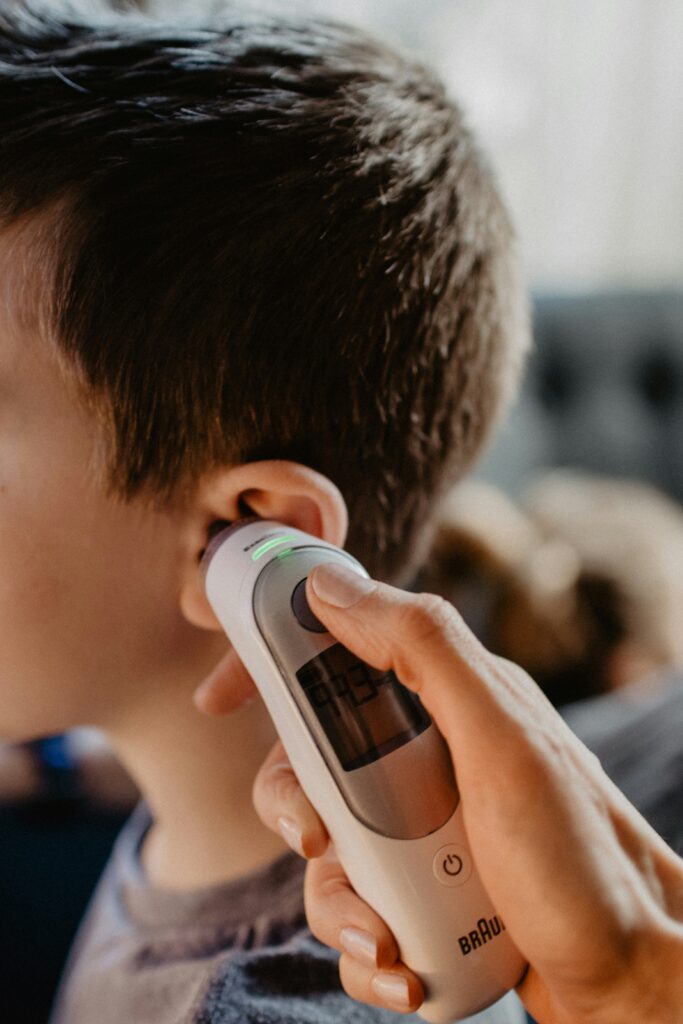When kids come into the picture, it is super important to always stay prepared. And a well-stocked medicine cabinet is non-negotiable. With it, it is easier to handle running noses, stomachaches, fevers, and even minor injuries without panicking. The goal is to have the essentials within reach when they are needed most. Let’s deep dive into the top products recommended by experienced parents for a reliable home medicine cabinet.
Pain and Fever Relief
Pain and fever are usually a thing when you’re dealing with young children. One moment they’re jumping around, and the next, they’re curled up and running a high fever. This is where having the right medications close by come in handy. It does help bring fast relief and avoid late-night pharmacy runs.
In this regard, you should stock up:
- Children’s acetaminophen or ibuprofen
- Dosing syringes or measuring spoons
- Cool compress packs or forehead patches
- A digital thermometer
Tip: Always check expiration dates and store dosing charts nearby for quick reference.
First Aid Kit for Cuts and Scrapes
A natural part of your kids growing up is that sometimes they will get some minor injuries. Cuts and scrapes are often caused by playing, bike falls, and playground accidents. Well, a well-stocked first aid kit keeps everything needed in one spot, so small accidents don’t turn into big worries.
This is why you should always stock these items in your house:
- Antiseptic wipes or sprays
- Antibiotic ointment
- A variety of bandages in different sizes
- Sterile gauze, medical tape, and blunt scissors
- Tweezers for removing splinters
- Instant cold packs for bruises and bumps
Fever, Cough, and Cold Essentials
When a child comes down with a cold or flu, it’s important to treat symptoms gently and consistently. Fevers and congestion can wear little ones out quickly. So, make sure to have these go-to supplies ready and within reach.
Some of the items you could stock include:
- The right fever medicine for kids albeit, make sure you check age and weight guidelines.
- Nasal spray or saline drops
- Nasal aspirator for infants and toddlers
- Child-safe cough syrup (age-appropriate)
- Chest rub with mild ingredients
- Soft tissues and a small waste bin
Digestive Support and Hydration
Tummy troubles can also strike without warning. Whether it’s a bug going around or too much cake at a party, children often need support to soothe their bellies and stay hydrated.
Here are some essentials that will come in handy:
- Electrolyte drink packets or oral rehydration salts
- Gas drops for babies
- Mild stool softeners or fiber supplements (pediatrician-approved)
- Children’s probiotics
- Vomit bags or a clean bowl
- Hand sanitizer or alcohol wipes
Allergy and Itch Relief
Whether it’s pollen, dust, or insect bites, allergies can lead to itchy skin, watery eyes, or more serious reactions. Being ready can bring quick relief and prevent symptoms from escalating.
You should thus keep:
- Antihistamines suitable for children
- Hydrocortisone cream for rashes
- Calamine lotion
- Aloe vera gel
- Cotton pads or gloves to discourage scratching
- An epinephrine auto-injector if prescribed
If a child has known allergies, include a copy of their emergency allergy plan in the same cabinet for easy access.
Tools and Accessories
Helpful tools make it easier to monitor symptoms and give care. These may not be medicine, but they’re just as important when taking care of children at home. Some of these useful items include:
- Extra thermometer batteries
- Nail clippers and emery boards
- A flashlight for checking throats or ears
- Pill organizer
- Medicine droppers and spoons with markings
- A small timer or watch to track doses
Keep smaller items in a pouch or drawer divider to avoid clutter. When things are organized, even the messiest moments feel a little more manageable.
Extra Comfort and Travel Readiness
Some additions aren’t essential, but they’re helpful for comfort and convenience, especially during travel or long days out. These extras add emotional relief to physical care, which kids often need just as much. So, consider keeping:
- Rehydration lollipops or electrolyte strips
- Soothing lip balm
- A travel-sized first aid kit
- A folder with important health records and allergy info
- A thermometer for travel use
- A notebook or printed medicine tracker
It also helps to include a few familiar items, like a comfort toy or calming scent, alongside these supplies to reduce anxiety during care.
Wrapping up
In a nutshell, having a stocked and organized medicine cabinet takes one thing off your mental load. When something unexpected happens, like say a fever, a cut, a cough and the likes you won’t be scrambling. You will already have what you need. It’s a good idea to go through everything every couple of months. It’s also wise to check for expired medicine, refill what’s low periodically. Also, make sure every medication still fits your child’s age and needs. Keep it all somewhere safe, out of reach for kids, but easy for adults to grab fast. All said and done, staying ready doesn’t have to be complicated. Just a few smart habits can make those tough moments a lot easier to handle.
You may also like
Why Local Pediatric Care Matters More Than You Think in Your Parenting Journey
How Parents Can Assist Their Kids After a Catastrophic Injury

